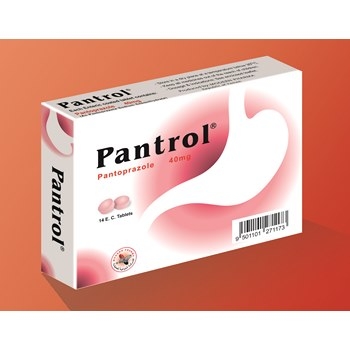pantrol 40
Pantoprazole is gastric acid pump inhibitor and antiulcer agent. It is a
specific inhibitor of the proton pump of H+/K+ ATPase, the enzyme
responsible for the secretion of acid by the gastric partial cells. By
virtue of its mechanism of action on the terminal phase of secretion.
Pantoprazole provokes a durable inhibition of basal & stimulated
gastric acid secretion.
- Pantoprazole is rapidly absorbed , oral bioavailability is 77%. It is
highly bound to plasma proteins (98%) and undergoes extensive
hepatic metabolism by CYP2C19 & excreted mainly renally.
- Pantoprazole absorption is not affected by concomitant administration
of antacids & administration of Pantoprazole with food may delay its
absorption up to 2 hours or longer, but C max & extent of Pantoprazole
absorption are not affected


